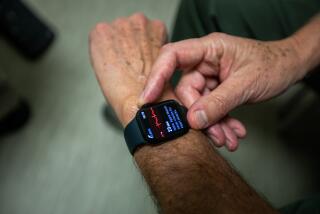Other Cases Involve Cement, Aspirin Industries : ITC Finds ‘Material Injury’ by Japanese in Dumping of Chips
- Share via
The U.S. International Trade Commission ruled Wednesday that U.S. semiconductor makers were “materially injured” by the dumping of Japanese-made EPROMs, a type of memory chip. The finding would allow dumping duties to be imposed on the Japanese imports of EPROMs if the U.S.-Japan trade agreement on semiconductors falls apart.
The International Trade Commission ruling came on the same day that the federal government announced it will investigate Japan’s marketing of supercomputers to determine whether trade agreements are being violated.
The investigation was initiated on the recommendation of President Reagan’s Trade Strike Force, after U.S. companies alleged that Japan may be unfairly protecting and promoting its supercomputer industry.
The ITC ruling on chip dumping came amid trade action in two other industries:
- The ITC concluded that U.S. cement producers have not been injured by imports of cement from eight countries, including Mexico and Japan. The preliminary finding stemmed from a dumping complaint brought Oct. 30 by Oakland-based Kaiser Cement and 12 other U.S. manufacturers. Michael Stein, attorney for the U.S. cement companies, said an appeal will be considered. “We’re going to have to think of something,” Stein said. “This industry is dying because of imports.”
- The ITC made a preliminary finding that the domestic aspirin industry has been harmed by reports of aspirin powder from Turkey. That complaint now goes to Commerce, to determine whether the Turkish government is subsidizing aspirin powder, and whether it is being sold in the United States at less than fair market value.
The dumping case involving memory chips, in which three major Silicon Valley chip makers accused Japanese companies of selling the devices at prices below fair value, now goes back to the U.S. Commerce Dept. to assign dumping margins. Those margins--the difference between the chips’ average selling prices and fair market value--will determine the duty imposed on each maker’s products if the case is reinstated.
An EPROM (erasable, programmable read-only memory) chip is an information storage device used in electronic goods. Instructions can be programmed, erased and reprogrammed in the chips, which are built into computers, telecommunications equipment, printers and the like.
In 1985, Japanese companies controlled 25% of the $405-million U.S. market for EPROMs.
Advanced Micro Devices, Intel and National Semiconductor, which brought the complaint in September, 1985, asked the government to pursue the dumping case even after the trade agreement was reached in July of this year.
In addition to the EPROM case, that agreement suspended an unfair trading practices complaint and a dumping case involving 256K D-RAMS, a chip more widely used than EPROMs. That D-RAM case has not been pursued since the agreement was signed.
If the government backed out of the trade accord, it would take as long as four months for the ITC to complete its investigation of possible injury to the U.S. industry.
A third chip-dumping case, involving 64K D-RAMs, was resolved before the trade accord was reached. Duties are being collected on imports of those chips.





